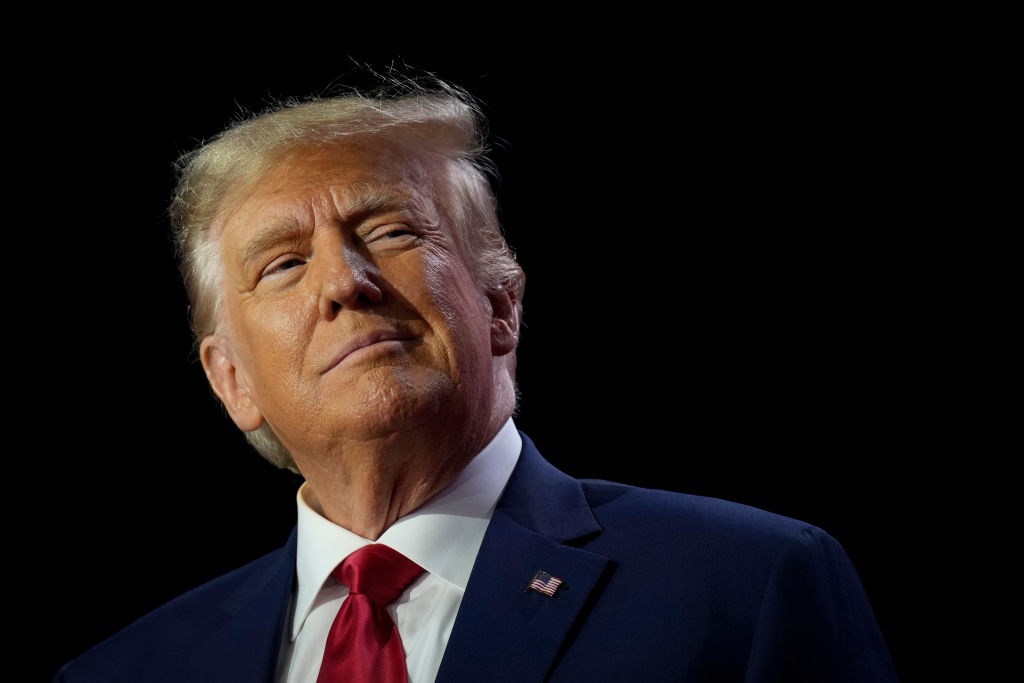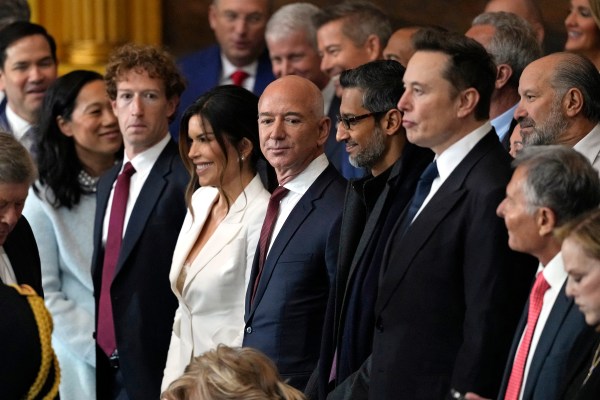Tracking Donald Trump’s legal situation often feels like drinking from a firehose, and on Tuesday the former president turned the spigot on. He announced that he had received a letter from the Department of Justice informing him he is the target of an investigation. That suggests the presidential candidate may be indicted in short order, possibly on charges related to the events of January 6, 2021. The legal and political worlds are colliding once again.
Next to nothing is certain about what the Department of Justice and special counsel Jack Smith have in store for Trump. At least for now. And that’s good, because there are plenty of developments to consider about Trump’s first federal indictment—and the politics therein.
First, a quick review of recent events related to the first federal indictment against Trump, which was over his the retention of classified documents at Mar-a-Lago:
After the indictment was filed last month, Judge Aileen Cannon of the Southern District of Florida set August 14 as the initial trial date. That was far too soon to be plausible. A few weeks later, the Department of Justice, which wants to move quickly, suggested a December trial date. Even a December start for this type of criminal indictment would be considered something close to light speed. In response, Trump’s legal team filed a motion last week to delay the start of the former president’s trial indefinitely (but definitely after the 2024 election).
Why would Trump seek such a lengthy delay? At the most basic level, criminal defendants who are being held in jail before trial want speedy trials. Criminal defendants who are out, don’t. This particular criminal defendant wants to make his trial a campaign issue. And if he’s elected president? This whole thing gets much, much weirder—and better—for him.
A nominee on trial?
It’s worth pausing to consider the politics behind Trump’s motion to delay the trial. What would it be like for a major-party presidential nominee to be in the middle of a criminal trial? The possibility is unprecedented at this level in American politics.
The assumption embedded in the Trump motion is that undergoing the trial itself, not to mention a potential guilty verdict, could be politically damaging or fatal to his presidential campaign—while simply being indicted is not. The model could be Texas Attorney General Ken Paxton, who was indicted in 2015 on securities fraud charges and has yet to face a trial. Since then, Paxton has been renominated by the Republican Party and reelected twice. Both the delay and the impression that he is “under attack” by his political opponents has worked to the Texas Republican’s benefit.
Trump, who backed Paxton in his competitive 2022 primary, has only improved his standing in the current GOP presidential primary field since he was indicted—first in Manhattan in a hush money case, and then by federal prosecutors last month over the document retention. He has done this in part by wearing the charges as a badge of honor, proof that the system is out to get him. It’s unlikely Trump would change tactics or strategy simply because he’s on trial, but the legal and political risks may increase as his legal and political interests collide.
“The biggest challenge is what works in the court of public opinion can become extremely problematic and a burden in the court of law,” says Kevin Madden, an adviser to Mitt Romney’s 2012 presidential campaign who also worked as a press aide to then-House Majority Leader Tom Delay during Delay’s multiple indictments.
Madden suggests a public-relations model for Trump, should he find himself getting ready for trial amid the campaign: former President Bill Clinton. The 42nd president never faced an indictment, but a series of campaign finance scandals created a messaging problem that risked derailing Clinton’s first term and his reelection effort. The Clinton White House responded by separating out a team to ferociously defend the president while the rest of the administration focused on governance.
Democratic lawyer and White House “special counsel” Lanny Davis oversaw all communications regarding these scandals and investigations, allowing the official White House press office to direct those questions to Davis’ team and for Davis himself to influence the narrative through strategic leaks. As Mike McCurry, Clinton’s White House press secretary at the time, told the Washington Post in 2018: “Lanny likes to quote me saying something to the effect of ‘McCurry told me my job was to take all the crap he was getting and figure out how to flush it.’”
Could Trump really silo his own communications effort this way? In theory, wouldn’t that give his legal team enough room to defend him in court while allowing his campaign to push the message that his case is one of political prosecution? It’s hard to conceive, especially given that Trump is his own chief communications strategist. What’s easier to conceive is Trump exiting the Miami courthouse every day of the trial to hold a campaign rally on the front steps in which he might say something damaging to his case. That’s the sort of scenario that would prompt a defense team to do everything it can to delay the trial.
Judging the arguments for delay.
Three days after the Trump defense moved to delay, the Department of Justice responded with a motion of its own opposing the defense’s gambit. Speedy trials, remember, aren’t just to benefit the defendant, but a right of the public to get justice.
On Tuesday, Judge Cannon held a hearing with all the parties and said she would issue a decision “promptly.” Let’s take stock of what these dueling motions say and what they mean.
First, consider the Trump team’s arguments for why the trial should be postponed and whether they were reasonable. To wit:
- There are hard legal questions in this case that no judges have ruled on yet.
- There are a lot of documents to go through and witnesses to talk to.
- The process for dealing with all the classified documents in this case will take a long time.
- There is a possibility the case will be thrown out so there’s no need to set a trial date.
- It will be impossible to find a jury to hear this case.
- Trump will be busy running for president and his lawyers have their hands full with all of his other cases.
We can easily dispense with several of these (1, 2, 4, and 6). Hard and new legal questions? Trump’s team can file a motion explaining what they are and why they are hard or new. As the DOJ responded, Trump “should not be permitted to gesture at a baseless legal argument, call it ‘novel,’ and then claim that the Court will require an indefinite continuance in order to resolve it.” Lots of documents and witnesses? Yes. That’s to be expected in a complicated case like this. And the good news for Trump is that if his team can’t get everything it needs from the government or doesn’t have time to read it all, his lawyers can tell the judge that. Don’t think this case will go to trial? Then Trump’s lawyers should win that argument, get the case tossed out, and it won’t matter whether there’s a trial date set for tomorrow. Trump’s busy? Nice try. Theranos founder Elizabeth Holmes tried “I’m having a baby” as an excuse and that didn’t work. Most criminal defendants have something they’d rather be spending their time on. And most lawyers have more than one case pending.
But that still leaves us with 3 and 5—the process for Trump’s defense to access the relevant classified documents will be too long and incomplete, and selecting an impartial jury will be impossible during an election year. It gets more interesting here, so let’s weigh both arguments.
‘Graymail’ and the jury selection problem.
We can start with a very basic premise in our criminal justice system: The defendant has every opportunity to put up the best defense possible. The burden is on the government to prove guilt; the defendant doesn’t need to prove his innocence. We guarantee a lawyer if the defendant can’t afford one. We force the government to turn over evidence it uncovers that could exculpate the defendant. We don’t force a defendant to testify in their own defense and we don’t let a jury infer anything negative about that decision.
How does any of this work when a case involves classified material? First, Trump’s attorneys will need to get security clearances just to review the evidence against their client. What happens when one of these documents references another document? Can Trump’s attorneys review that document? What if it’s classified under a special access program, indicating a document is highly classified? What if the agency responsible for that report says that it is so highly classified that showing it to anyone outside of the agency could endanger sources in the field? What if Trump’s lawyers not only insist on seeing that document but claim they need to present it at trial to defend their client?
All of these potential questions raise the concept of “graymail.” The idea is that a defendant can force the government to drop a criminal case because the attorneys cannot provide a defense without the classified information and the government is unable or unwilling to reveal the classified information at trial. The Classified Information Protection Act, known as CIPA, provides a process to minimize some graymail efforts—for example, it allows a judge to look at the information by herself and decide whether it’s really necessary or just a ploy.
But this process can take a really long time, and it requires a judge to make a counterintuitive (and appealable) decision to bar a criminal defendant from being able to present all of his arguments to the jury. This is one of the reasons why it was surprising for the Department of Justice to file this case in Florida, where judges don’t deal with classified information cases very often.
Trump’s lawyers are correct that the sheer volume of classified material in this case almost certainly means this thing isn’t going to trial in December. One lawyer who has tried several CIPA cases told The Dispatch a typical case moving at a normal speed would take around two years—the exact timeline that Trump’s lawyers are looking for anyway.
What about jury selection? The rules are straightforward—each juror must be able to be fair and impartial. Yet it can be hard to find 12 fair and impartial people when the case is all over the news. Think about O.J. Simpson—were his jurors under a rock for White Ford Bronco Day? Or the trial of Boston Marathon bomber Dzhokhar Tsarnaev, whose defense team sought to move the trial outside of Boston because of the difficulty in getting 12 impartial jurors in a case that so deeply affected the city.
What’s more interesting is that jurors in the Trump trial would be asked to weigh evidence impartially against a criminal defendant at the same time that they could be deciding whether to vote for that person for president of the United States. It’s not entirely unprecedented to have candidates running for office and being tried in the same year, but the scope and import of this particular case is different. And if the CIPA process drags out to, say, September 2024, would that be an ideal time to impanel a jury if the goal is justice?
Sarah’s view.
If December was never a realistic trial date, why would the defense not let nature take its course? Why file this motion—flagging to the judge that your goal is going to be to delay this thing as long as possible—rather than just file a bunch of motions and let the trial delay itself?
I don’t have a great answer to that question. It seems like a mistake to me. If Cannon grants the motion, it’s a win for Team Trump—but they were going to “win” anyway. If Cannon denies their motion, it’s a loss—but they are going to “win” anyway because they can just file additional motions and delay the thing anyway. And the downside is that as the defense files these motions, the government will argue that some of them are frivolous and only being used to delay the trial. Normally, defense counsel would be able to respond “Absolutely not, your honor. I’m just trying to get my client a fair hearing.” But after this motion, it’s going to be hard to argue that they don’t want to delay the trial when they literally just said they did.
Bottom line at the bottom: This is going to be what it is and the outcome of this motion may tell us where Judge Cannon’s head is but that’s about it. This trial is going to be a ways off.
Also, this is a pet peeve, but Trump’s legal team used the totally unnecessary Latin term vel non and like so many heretofores and whereases, it’s not a good sign when lawyers fall back on big words rather than clear arguments.








Please note that we at The Dispatch hold ourselves, our work, and our commenters to a higher standard than other places on the internet. We welcome comments that foster genuine debate or discussion—including comments critical of us or our work—but responses that include ad hominem attacks on fellow Dispatch members or are intended to stoke fear and anger may be moderated.
With your membership, you only have the ability to comment on The Morning Dispatch articles. Consider upgrading to join the conversation everywhere.